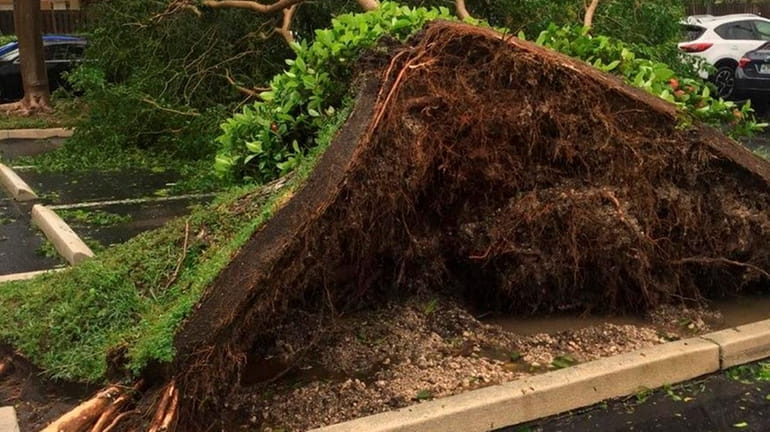Irma’s impact: Ex-Long Islanders in Florida assess damage

Former Deer Park resident Anthony Favata, who's now living in Plantation, Fla., saw this uprooted tree caused by Hurrican Irma on Sunday, Sept. 10, 2017. Credit: Anthony Favata
For some former Long Islanders in Florida, Irma brought rattled nerves but not much damage.
For others, it made superstorm Sandy — which devastated Long Island in 2012 — seem easy.
Pat Meyersfield relocated last year to Lake Worth, Florida, from Riverhead, and decided to stay put with her husband, Sandy; her mother, Eleanor Keller, 96; and two family cats as Irma barreled into her new hometown Saturday night.
“It was very scary,” she said, adding that she was particularly distressed by the six tornado alerts she received by phone, text and on the news.
The alerts started coming in late Saturday, forcing her to run into and out of a closet she designated as her “safe room” as the rain pounded on her windows and walls.
“The sound of the wind was painful,” she said. “We have storm shutters up, but you could hear the rattling. You could hear things hitting the house.”
A resident of Long Island for 40 years before her move south, Meyersfield said, in retrospect, Sandy wasn’t so bad.
“It was nothing like this,” she said. “With Sandy, we didn’t have tornado warnings. This was definitely worse.”
John Cronin, 53, of East Northport, sat out the storm with his parents, Chester and Joy Cronin, at the former Long Islanders’ home in Naples. By Sunday evening, the National Hurricane Center reported water levels rising rapidly in the area from the storm surge, while Naples Municipal Airport recorded a wind gust of 142 mph.
As of Monday morning, the Cronins were still without power. It had gone out around 4 p.m. Sunday.
Water had flooded the street by Sunday afternoon and was creeping up the driveway, but “luckily” never made it into their home, John Cronin said — though outside, it did rise to “about knee-high.”
In preparation for flooding, the Cronins had put pool floats in the attic and pulled down the ladder in case they had to retreat to higher ground, John Cronin’s wife, Leslie, said from Long Island on Sunday.
But none of that was needed.
The wind had ripped off a few of the Spanish tiles from their roof and a light fixture from their garage, but “everything else looks fine,” John Cronin said Monday.
The storm’s reach extended some 400 miles across the state, though the full extent of the damage was still unclear on Monday.
Anthony Favata, 52, originally from Deer Park, considered himself “lucky.”
He hunkered down in his home in Plantation and prepared for a storm that was, at one point, the most powerful hurricane ever recorded in the open Atlantic.
By Monday morning, Irma was downgraded to a tropical storm as it began moving into Georgia, but not before knocking out power to more than 6.5 million Florida homes and businesses, and forcing 220,000 people into shelters. Officials warned it could take weeks for electricity to be restored to everyone.
Favata shuttered his windows and filled his cars with gas. He lost power early Sunday morning and anticipated he’d be without it for several days.
Instead, power was restored by midnight and when Favata ventured outside early Monday, he saw no structural or water damage to his home.
Overnight, he had listened as wind and rain whipped against his home, and tornado warnings flashed on his phone, but his only evidence of storm damage was debris in his yard and trees on his street ripped from the ground, he said.
“We were nervous, but we’ve been through it before,” said Favata, who moved to Florida 29 years ago. “We knew what to expect and did the best we could to prepare.”
Greg and Lorraine Gloumakoff remained in their new home in Vero Beach. The Gloumakoffs moved from Middle Island this summer.
They said the high winds and rain worried them, but didn’t damage their home at all.
“It was a little inconvenient, but all in all, not a terrible experience,” said Greg Gloumakoff, 56.
Leslie Gross has yet to see what damage Irma may have wreaked on her home.
Gross, who moved from Manhasset to Wellington, on Florida’s east coast, in March, evacuated with her husband, mother and Tibetan terrier on Thursday. They drove 170 miles north to a hotel in Orlando, which took six hours instead of the usual 2 1⁄2, she said, as people fleeing the storm crowded the highways.
“The reports were very frightening,” she said.
But as the storm reared inland Sunday evening, Gross said the hotel’s parking lot became flooded and palm fronds covered the streets.
“I’ve never heard anything so loud, and I lived through Sandy,” she said of the rain and wind gusts.
Gross will remain in Orlando until Tuesday morning and said she’s nervous about what she’ll find when she returns home.
With The Associated Press
Updated 42 minutes ago Teacher pay ... Trump in court today ... Santos' request to unseal witness statements ... Autism walk
Updated 42 minutes ago Teacher pay ... Trump in court today ... Santos' request to unseal witness statements ... Autism walk
